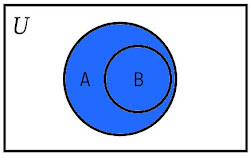Common problems from the short multiplication formulas
1 Problem Find the numerical value of the expression $a^2+b^2$ if $a+b=5$ and $ab=9$.
Solution: Let's recall the formula for truncated multiplication $(a+b)^2=a^2+2ab+b^2$, which we have already reviewed here. Notice that $a^2+b^2=(a+b)^2-2ab$, this is because $(a+b)^2-2ab=a^2+2ab+b^2-2ab$, and the ones complement $2ab$ and $-2ab$ are truncated. Thus, we have already figured out how to represent $a^2+b^2$ as the sum and product of $a$ and $b$, hence $a^2+b^2=(a+b)^2-2ab=5^2-2.9=25-18=7.$
Problem 2 Prove the identity $(ab+cd)^2=(a^2+c^2)(b^2+d^2)-(ad-cb)^2.$
Solution: We need to prove that the left side of this equality is equal to the right side. We will simplify both sides of the equality and compare them, hence $LS=a^2b^2+2abcd+c^2d^2$. Now we simplify the right-hand side of the equality
$LS=a^2b^2+a^2d^2+b^2c^2+c^2d^2-(a^2d^2-2adcb+c^2b^2)=$
$=a^2b^2+a^2d^2+b^2c^2+c^2d^2-a^2d^2+2adcb-c^2b^2=a^2b^2+c^2d^2+2abcd$.
Thus we get that $LS=RS$ and the equality is an identity.
Problem 3 Calculate $x^3+y^3$ if $x+y=t$ and $x^2+y^2=k$.
Solution: It is now well known that $x^3+y^3=(x+y)(x^2+xy+y^2)$, a formula we have already considered here. We write the above equality as follows $x^3+y^3=(x+y)(x^2+y^2+xy)$. We already know from the problem condition that $x+y=t$ and $x^2+y^2=k$, so $x^3+y^3=t(k+xy)$. Now we need to express $xy$, in terms of $t$ and $k$. We have already seen from Problem 1 in this lesson that $a^2+b^2=(a+b)^2-2ab$ and hence $2ab=(a+b)^2-(a^2+b^2)$, where $xy=\frac{t^2-k}{2}$. We replace $xy$ by $\frac{t^2-k}{2}$, whence $x^3+y^3=t(k-\frac{t^2-k}{2})=\frac{t}{2}(3k-t^2).$
4 Problem Put the polynomial $B=\frac{(x-m)^2}{2}+\frac{(m-x)(m+x)}{4}-\frac{x(3x-m)}{12}$ into normal form.
Solution: The common denominator of the three fractions is obviously 12, we bring the fractions under common denominator and get $B=\frac{6(x-m)^2+3(m-x)(m+x)-x(3x-m)}{12}=\frac{6x^2-12mx+6m^2+3m^2-3x^2-3x^2+mx}{12}=$
$=\frac{9m^2-11mx}{12}=\frac{3}{4}m^2-\frac{11}{12}mx. $
5 Problem Does the value of the expression $(x+11)^2+(x-11)^2-3(x-3)(x+3)$ depend on the values of $x$?
Solution: In order to answer the question posed, we need to reveal the parentheses and perform the apparitions. If we then get a constant, i.e. a number, it means that the expression does not depend on the value of $x$, if we get a singleton or polynomial involving $x$ then the value of the expression depends on the value of $x$. We open the parentheses $(x+11)^2+(x-11)^2-3(x-3)(x+3)=x^2+22x+121+x^2-22x+121-2(x^2-9)=x^2+22x+121+x^2-22x+121-2x^2+18.$ Notice that all the monomials involving $x$ are truncated and the given expression equals 260. From this we conclude that whatever the value of $x$ this expression will always be equal to 260 i.e. the answer to the question posed is that the value of the expression does not depend on the values of $x$.
6 Problem Compare the numerical values of $A=(x-2)(x^2+2x+4)-(x-1)^3-2$ and $B=3(x^2-x-3)$ for the same $x$.
Solution: Therefore,
$A=x^3-8-(x^3-3x^2+3x-1)-2=$
$=x^3-8-x^3+3x^2-3x+1-2=3x^2-3x-9.$
Now we reveal the parentheses in the expression $B$ as well and get that $B=3x^2-3x-9$. From here we can clearly see that $A=B$ for the same $x$.
7 Problem Simplify the expression $(x-1)(x^2+x+1)-(x+1)(x^2-x+1)+(x+1)^2-(x+2)(x-2)$ and find its numerical value at $x=1\frac{1}{2}.$
Solution: Expand the parentheses and simplify the expression literally, and then substitute in $x=1\frac{1}{2}$: $x^3-1-(x^3+1)+x^2+2x+1-(x^2-4)=$
$=x^3-1-x^3-1+x^2+2x+1-x^2+4=2x+3$.
Now replace $x$ with $1\frac{1}{2}=\frac{3}{2}$ and we get $2.\frac{3}{2}+3=6$, which solves the problem.
8 Problem Calculate rationally the expression $\frac{(63+28)(63^2-63.28+28^2)}{a(63^3+28^3)}+(\frac{1}{b}-\frac{1}{c})(\frac{1}{b}+\frac{1}{c})$ for $a=9$, $b=2$, $c=3$.
Solution: Notice that $(63^3+28^3)=(63+28)(63^2-63.28+28^2)$, hence $\frac{(63+28)(63^2-63. 28+28^2)}{a(63^3+28^3)}+(\frac{1}{b}-\frac{1}{c})(\frac{1}{b}+\frac{1}{c})=\frac{(63+28)(63^2-63.28+28^2)}{a(63+28)(63^2-63.28+28^2)}+(\frac{1}{b}-\frac{1}{c})(\frac{1}{b}+\frac{1}{c})$. For the product $(\frac{1}{b}-\frac{1}{c})(\frac{1}{b}+\frac{1}{c})$, we apply the formula $(a-b)(a+b)$, which is discussed in more detail here, from where we obtain that the given expression is equal to $\frac{1}{a}+\frac{1}{b^2}-\frac{1}{c^2}$. Now substitute $a$, $b$ and $c$ with their numerical values and we get $\frac{1}{9}+\frac{1}{4}-\frac{1}{9}=\frac{1}{4}$.
Homework assignments
1. Prove the identity $(a+b+c)^2+(-a+b+c)^2+(a-b+c)^2+(a+b-c)^2=4(a^2+b^2+c^2)$.
2. For which value of the parameter $a$ does the polynomial $4x(x^2-3x+a)-8ax^2(x-4)^2+12(x-1)(x^2+x+1)$ not contain a third degree term in its normal form?
3. Find the value of the polynomial $\frac{1}{x}(x+\frac{1}{2})^2+4(5x-2\frac{1}{4})-(\frac{x}{2}-2)(\frac{x}{2}+2)$, given $x=-\frac{2^4}{4^3}$.
4. Bring the polynomial $M=12(\frac{4x+1}{4}-\frac{3x-2}{3}+\frac{x^3}{12})-\frac{2(1-x)^2-4x^2}{2}+(2-x)^3$ into normal form and calculate its value at $x=-\frac{1}{2}.$
5. Bring the expression $(x+1)(x-1)-(-x-2)^2$ into normal form.
6. Find the value of the expression $(x-2)^2-2(x-2)(x+2)+(x+2)^2-2x$, at $x=-|-\frac{3}{4}|$.



Коментари
Публикуване на коментар